TAIWAN
Overview
Rice cultivation is still important in Taiwan despite rural out-migration, limited economic returns, and the competition for water from other sectors. Labor constraints have made SRI appear less feasible than in some other countries, but SRI's water-saving possibilities as well as its reduction in production costs have made it of interest to some individuals and institutions, and there is interest in finding ways to mechanize some SRI operations so that the production potentials of SRI are tapped. At the same time, the frequent damage from pests, weeds and diseases has led to the high input of chemical inputs with resulting soil deterioration in Taiwan. Through the practice of SRI, it is expected that farmers can be not only food producers but also protectors of the environment. The use of SRI is regarded as an environment-friendly option for rice farmers instead of creating irreversible chemical impacts on the agro-environment through conventional rice cultivation practices.
Since 2008, Prof. Yu-Chuan Chang, a faculty member of Hsing Wu University in Taipei, has been working with a number of colleagues in different institutions to conduct trials evaluating SRI. Chang is also an adjunct professor in the Graduate School of Frontier Studies, University of Tokyo, where he learned about SRI from Prof. Eiji Yamaji, a member of that faculty who serves as chair of J-SRI, the Japan Association for SRI. The first trials began on farmers' fields in 2008, but there has not been enough systematic study. Yield improvements have ranged from 4% to 99% with 20-25 cm spacing, and decreased with 30 cm spacing. Rice has been overproduced in Taiwan, so there is most interest in SRI's potential for higher water productivity and water saving, given the strong competition for water in Taiwan.
The core of interested researchers coming together to work on SRI includes a professor of agronomy at National Taiwan University and a professor of civil engineering at National Chung Hsing University. The trials being undertaken now have support from the Council of Agriculture of the Executive Yuan (national government), Republic of China. Chang has started a Facebook site for communication about SRI in Taiwan, and he also maintains a Chinese language blog on SRI.
In 2010, Prof. Yu-ping Lin, professor of Bioenvironmental Systems Engineering at National Taiwan University, while chief managing editor of the international journal Paddy and Water Environment invited Prof. Norman Uphoff (Cornell University, USA) and Prof. Amir Kassam (University of Reading, UK) to guest-edit a special issue of the journal on the System of Rice Intensification. This was published in 2011 (vol. 9, no. 1). Uphoff was invited to give a keynote presentation on SRI at the 11th international meeting of the Paddy and Water Environment Engineering Society held in Taipei in October 201; research reports on SRI were made by meeting participants from Indonesia, Korea and Taiwan. In 2013 Prof. Lin invited Uphoff, Kassam and Dr. A.K. Thakur to guest-edit a special issue of Taiwan Water Conservancy on SRI (Vol. 61, No. 4).
Based on SRI concepts, further trials were undertaken from 2010 to 2012 with financial support of the Taiwan government, but trials so far have focused mainly on the agricultural productivity of different management practices, not including social and environmental considerations. The main conclusions from the trials to date have been that in Taiwan, SRI techniques can be applied with high potential yield gain during the first cropping season when there can be higher productivity of labor, capital, and irrigation water. However, regarding the second season, even though SRI can generate higher factor productivity, the lower temperatures and greater damage from pests, diseases, weeds and flooding creates more risk of yield losses, which narrows the range for exploiting the potential labor, capital and irrigation water productivity gains of SRI (Chang et al., 2013).
In 2013, an Earth Guardian Group (EGG) to promote SRI, was launched by Mr. Tony Liu, chairman of Caremed Supply Inc., a medical equipment company that seeks to be environmentally friendly. The initial conclusions from SRI research in Taiwan were published in the journal Paddy and Water Environment in 2015. (See item below). During 2015, the members of the EGG, including Prof. Kan and Prof. Chang, adapted SRI principles to rice cultivation on Guandu Plain in Taipei City, an area subject to land speculation with rising land prices, with a large number of farmers relying on off-farm income and lacking incentives to increase their rice productivity. The adaptive principles included 30% decrease in seeds using flat nursing trays and draining of the land at least two days in a week. The healthy root systems, strong stems and heavy panicles resulted in 30% water saving during drought season and a 20-60 % increase in yield with better rice quality. With less pesticide and chemical inputs, this eco-friendly paddy farming has been formulated to encourage farmers to practice SRI principles. (See item below for details).
During 2016, the first general meeting of Taiwan's new Society of Conservation Agriculture - System of Rice Intensification (CA-SRI) was held on July 2. (See their new website for details). On March 29, a meeting of the Taiwan - Japan SRI Research Group place to discuss continuing collaboration between the two counties. During 2017, a study at the National Pingtung University of Science and Technology showed that high yield can be obtained under SRI using half or even one quarter of the amount of irrigation water consumed by conventional flooding (see article in the journal Water). During early 2017, "稻作革命SRI (System of Rice Intensification)," the Chinese language version of Norman Uphoff's 2016 book "The System of Rice Intensification (SRI) - Responses to Frequently Asked Questions," was published in Taiwan.
Progress and Activities
2021 Updates
 Smart Irrigation Control System for Paddy Field
Pioneered for SRI
Smart Irrigation Control System for Paddy Field
Pioneered for SRI
[May 12, 2021] A study by Li-Wei Liu et al set out to establish a water-saving irrigation technique-based Smart Field Cultivation Server (SFCS) for paddy field irrigation by employing information and communication technologies. The development of SFCS considered the requirement on rice growth, pest development, and fieldwork management. The proposed SFCS was equipped with a solar power supply system and consisted of sensors including illumination, air temperature, air humidity, water level, soil moisture content, soil electronic conductivity, and soil temperature. Narrowband Internet of Things (NB-IoT) is used for data transmission due to the data size and transmitting frequency. A smartphone-based application (APP) has been developed for users to monitor field environment by tabular, dashboard panel, and whisker chart box, providing multiple data display ways for different purposes. A water-saving irrigation technique named system of probiotics rice intensification (SPRI) has been integrated into the APP. With the developed APP, farmers will receive fieldwork reminders by calendar day that water-saving irrigation may be possibly implemented. [See full article published in the journal AGROHITA]
,
2018
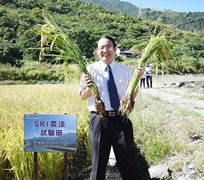
 National Pingtung University of Science and Technology Combines Hi Tech and Sustainable Eco-Friendly Methods to Ensure Food Security
National Pingtung University of Science and Technology Combines Hi Tech and Sustainable Eco-Friendly Methods to Ensure Food Security
[January 12, 2018] An article is Taiwan's Business Weekly, describes how National Pingtung University of Science and Technology is committed to combining advanced smart technologies and more eco-friendly, sustainable land management technologies in order to solve the problems of food security. Due to climate change and water shortages, the Department of Civil Engineering and Water Conservation uses SRI, which uses organic inputs to enhance soil activity along with other sustainable methods of managing soil, water and nutrients. SRI promotes healthier, more deeply-rooted plants, saves water, and increases yields by 30%. Meanwhile, smart irrigation technologies are being used to control water more efficiently, and unmanned aircraft take infra-red images to estimate chlorophyll in order to improve field management efficiency. [See full article.]
2017 Updates
-
 Chinese Version of Uphoff's Book on Responses to Frequently Asked Questions
on SRI Published
Chinese Version of Uphoff's Book on Responses to Frequently Asked Questions
on SRI Published
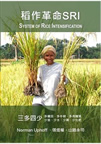 [February 16, 2017] "稻作革命SRI (System of Rice Intensification)," the Chinese language version of Norman Uphoff's 2016 book "The System of Rice Intensification (SRI) - Responses to Frequently Asked Questions" was published in early 2017. The Chinese version, which has an extended section on SRI in Taiwan, was co-authored/translated Yu-Chuan Chang and Eiji Yamaji . The cost on the book varies from US$41.00 (with shipping) on the yesasia.com website to US$21.49 (without shipping) on the PChomeUSA site. (Check the internet for other options to obtain a copy.)
[February 16, 2017] "稻作革命SRI (System of Rice Intensification)," the Chinese language version of Norman Uphoff's 2016 book "The System of Rice Intensification (SRI) - Responses to Frequently Asked Questions" was published in early 2017. The Chinese version, which has an extended section on SRI in Taiwan, was co-authored/translated Yu-Chuan Chang and Eiji Yamaji . The cost on the book varies from US$41.00 (with shipping) on the yesasia.com website to US$21.49 (without shipping) on the PChomeUSA site. (Check the internet for other options to obtain a copy.)  Journal Article Shows Impact of SRI Water Management in Southern Taiwan
Journal Article Shows Impact of SRI Water Management in Southern Taiwan
[January 2017] A study by Pascual and Wang published in the journal Water reconfirms that not all the specific attributes of SRI management are required in order to have a positive effect on plant growth, increased yields, and enhanced water productivity. Research was carried out in 2016 at the National Pingtung University of Science and Technology in the southern Taiwan to determine the effects of crop growth, yield and irrigation water use, using two thirds of the recommended SRI practices and two rice varieties (Tainan11 and Tidung30). Irrigation regimes were (a) intermittent irrigation with three-day intervals (b) intermittent irrigation with seven-day intervals and (c) continuous flooding (CF). Results shows that considerably high yield can be obtained under SRI using half or even one quarter of the amount of irrigation water consumed by CF. Under intermittent irrigation of three-day intervals, yield was similar with to that of CF and may be credited to changes caused by SRI practices in all components of a rice plant, below and above the ground surface. Amidst labor constraints, which have made SRI appear less feasible in Taiwan, adopting SRI can contribute to a reduction in synthetic fertilizer, which has been a major cause of water contamination. The article concludes that, with the impacts of climate change, and the growing competition for water in this region, SRI offers an opportunity worth exploring in Taiwan; however, further study on various components of rice water requirements is needed. [see full article in Water 2017, 9(1)]
2016
 Taiwan's Society of Conservation Agriculture - System of Rice Intensification (CA-SRI) Holds First General Meeting
Taiwan's Society of Conservation Agriculture - System of Rice Intensification (CA-SRI) Holds First General Meeting
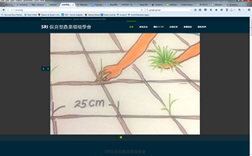 [July 12, 2016] The first general meeting of Taiwan's new Society of Conservation Agriculture - System of Rice Intensification (CA-SRI) was held on July 2, 2016. More information about the CA-SRI Society is available on their new website (right). For more information on the CA-SRI activities, contact Yu-Chuan Chang.
[July 12, 2016] The first general meeting of Taiwan's new Society of Conservation Agriculture - System of Rice Intensification (CA-SRI) was held on July 2, 2016. More information about the CA-SRI Society is available on their new website (right). For more information on the CA-SRI activities, contact Yu-Chuan Chang. The Second Workshop on Taiwan - Japan SRI Research Takes Place in Taipei
The Second Workshop on Taiwan - Japan SRI Research Takes Place in Taipei
 [April 1, 2016] The Second Workshop for Taiwan - Japan SRI Research took place in Taipei, ROC, on March 29, 2016. It was organized by the Society of Conservation Agriculture - System of Rice Intensification (CA-SRI).
Technical tours were supported by Chi-Seng Water Management Research & Development Foundation and Chiunglin Township Administration, HCG. Keynote speeches were given by Prof. Eiji Yamaji from University of Tokyo (SRI in Japan and in Developing Countries) and by Prof. Yu-Chuan Chang from Hsing Wu University, Taiwan
(The Development of CA-SRI in Taiwan).
[April 1, 2016] The Second Workshop for Taiwan - Japan SRI Research took place in Taipei, ROC, on March 29, 2016. It was organized by the Society of Conservation Agriculture - System of Rice Intensification (CA-SRI).
Technical tours were supported by Chi-Seng Water Management Research & Development Foundation and Chiunglin Township Administration, HCG. Keynote speeches were given by Prof. Eiji Yamaji from University of Tokyo (SRI in Japan and in Developing Countries) and by Prof. Yu-Chuan Chang from Hsing Wu University, Taiwan
(The Development of CA-SRI in Taiwan).
 Uphoff's Book on SRI Frequently Asked Questions to be Translated in Chinese
Uphoff's Book on SRI Frequently Asked Questions to be Translated in Chinese
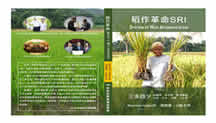 [March 2016] Norman Uphoff's recent publication, The System of Rice Intensification (SRI) - Responses to Frequently Asked Questions, is being translated into Chinese by the Society of Conservation Agriculture - System of Rice Intensification (CA-SRI). SRI-Rice will post information here when it is available. Or, you can check the CA-SRI website for updates. [The English language version is a 226-page book (10 MB) that can be downloaded from the SRI-Rice website free of charge OR purchased from Amazon.com for $41.33 (€38.33)].
[March 2016] Norman Uphoff's recent publication, The System of Rice Intensification (SRI) - Responses to Frequently Asked Questions, is being translated into Chinese by the Society of Conservation Agriculture - System of Rice Intensification (CA-SRI). SRI-Rice will post information here when it is available. Or, you can check the CA-SRI website for updates. [The English language version is a 226-page book (10 MB) that can be downloaded from the SRI-Rice website free of charge OR purchased from Amazon.com for $41.33 (€38.33)].
2015
 Earth Guardian Group Adapts SRI Principles to Rice Cultivation on Guandu Plain
Earth Guardian Group Adapts SRI Principles to Rice Cultivation on Guandu Plain
[July 22, 2015] According to an article in the News and Market blog, members of the Earth Guardian Group (EGG), including Prof. Kan and Prof. Chang, have adapted SRI principles to rice cultivation on Guandu Plain in Taipei City, an area subject to land speculation with rising land prices, with a large number of farmers relying on off-farm income and lacking incentives to increase their rice productivity. The adaptive principles included 30% decrease in seeds using flat nursing trays and draining of the land at least two days in a week. The healthy root systems, strong stems and heavy panicles resulted in 30% water saving during drought season and a 20-60% increase in yield with better rice quality. With less pesticide and chemical inputs, this eco-friendly paddy farming is formulated to encourage farmers to practice SRI principles.
Among the participants in this collaborative project, a co-operating group of SRI farmers has been organized under the leadership of Mr. Shih-Wen Chou of the Chi-Seng Irrigation Association to guarantee the quality and safety of food, instituting an inspection service and food-source traceability integrating information and activity from field to market. It has been seen that in Taiwan, SRI principles can be adopted by local farmers without need for additional premiums through eco-friendly collaboration that can raise simultaneously the productivity of land, capital and irrigation water. In addition, this collaboration can take advantage of increasing consumer demand for safe food with fewer chemicals and for sustaining a greater level of biodiversity.
 Dr. Kan Chun-E Presents Seminar on Adapting SRI to Conditions in Taiwan
Dr. Kan Chun-E Presents Seminar on Adapting SRI to Conditions in Taiwan
[April 16, 2015] Chun-E Kan, a professor at National Taiwan University and supervisor of the EGG trials noted above, presented a seminar at Cornell University on April 16 entitled The System of Rice Intensification in Taiwan: Adapting SRI to Existing Farming Systems and Making Links with the Private Sector. The seminar included discussions on constraints, including golden apple snail infestation, and suggested a conceptual framework of SRI collaboration for large-scale paddy farming in Taiwan. The efforts of a corporation to adapt SRI and sell the rice to the employees was described; SRI is of interest to many Taiwanese who are becoming wary of the affects of agrochemicals on their health. (See PowerPoint presentation.)
 Conceptual Framework for SRI-Based Paddy Farming in Taiwan Published
Conceptual Framework for SRI-Based Paddy Farming in Taiwan Published
[March 2015] In article outlining a shift in the current rice production system in Taiwan authored by Yu-Chuan Chang, Norman T. Uphoff, and Eiji Yamaji was published during March 2015 in the journal Paddy and Water Environment. A conceptual framework for eco-friendly paddy farming in Taiwan, based on experimentation with System of Rice Intensification (SRI) methodology reviews the constraints and challenges of paddy farming in Taiwan and proposes a set of eco-friendly rice farming practices raised by SRI principles from exploratory SRI trials conducted in Taiwan. The trials show that even with less exact leveling in the SRI field than is ideally provided, the average yield for SRI was higher than for convention practices; with an aerobic soil situation, the combination of biocontrol agent application and SRI management was seen to give better rice blast control; and the highest paddy yield was obtained from single-seedling transplants from potted nursery trays which protect the young seedlings’ roots from shock or twisting, compared with the planting of more numerous seedlings grown on flat nursery trays by a mechanical rice transplanter. The article concludes with a conceptual framework for eco-friendly paddy farming formulated to encourage farmers to practice SRI principles.
Among the participants in this collaboration, a cooperating group of SRI farmers are being organized under investor sponsorship to guarantee the quality and safety of food, integrating an inspection service and food-source traceability from field to market with the production process. In Taiwan, experience shows that SRI principles can be adopted by local farmers without the need for additional premiums through eco-friendly collaboration that can raise simultaneously the productivity of land, capital, and irrigation water. In addition, this collaboration can take advantage of increasing consumer demand for safe food
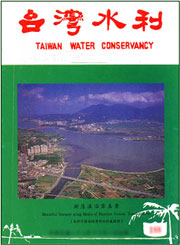 with fewer chemicals and for supporting a greater level of biodiversity.
with fewer chemicals and for supporting a greater level of biodiversity.
2013
 Taiwan Journal of Water Conservancy Edition devoted to System of Rice Intensification
Taiwan Journal of Water Conservancy Edition devoted to System of Rice Intensification
During late 2013, Norman Uphoff, Amir Kassam and Amod Thakur edited an issue of the Taiwan Journal of Water Conservancy (at right), which is devoted to System of Rice Intensification. Volume 64, no. 4 of the TJWC contains 10 articles, all of which consider various aspects of water use with SRI. The journal articles are in English with Chinese language abstracts included.
 Earth Guardian Group (EGG) promotes SRI in Taiwan
Earth Guardian Group (EGG) promotes SRI in Taiwan
During 2013, an Earth Guardian Group (EGG) to promote SRI was conceived and launched by Mr. Tony Liu, chairman of Caremed Supply Inc., a medical equipment company that seeks to be environmentally friendly. The initial conclusions from SRI research in Taiwan were published in the journal Paddy and Water Environment in during 2015 (see summary above).
2010-2012
- Based on SRI concepts, SRI trials were undertaken from 2010 to 2012 with financial support of the Taiwan government, but trials so far have focused mainly on the agricultural productivity of different management practices, not including social and environmental considerations. The main conclusions from the trials to date have been that in Taiwan, SRI techniques can be applied with high potential yield gain during the first cropping season when there can be higher productivity of labor, capital, and irrigation water. However, regarding the second season, even though SRI can generate higher factor productivity, the lower temperatures and greater damage from pests, diseases, weeds and flooding creates more risk of yield losses, which narrows the range for exploiting the potential labor, capital and irrigation water productivity gains of SRI. (Chang et al., 2013).
Reports, News and Publications
- 2017. SRI probiotics friendly-farming method allows soil to breathe: Waiting for rich harvest. National Pingtung University of Sicnece and Technology website. December 1. [Director of the NPUST Department of Civil Engineering, Professor Yu-Min Wang, oversees the Water Conservation Lab responsible,a 10 year research initiative on improved crop cultivation methods. The SRI Probiotics Project has received funding from the Council of Agriculture, the Pingtung Irrigation Association and the SRI Society of Conservation Agriculture (CA-SRI)]
- 2018. 青農的美好年代 屏科大「農藝復興」傳奇, Business Weekly, January 12. [National Pingtung University in Taiwan values values and mixes smart technologies with sustainable methods - cites SRI as example]
- Uphoff, Norman, Zhang Yu Quan, and Shan Lu Yong Si. 2017. 稻作革命SRI (System of Rice Intensification). [Chinese language version of Norman Uphoff's 2016 book "The System of Rice Intensification (SRI) - Responses to Frequently Asked Questions"] [Check various sites for varying prices.]
- Lin, Huizhen. 2015. 減水3成「根」強壯 關渡SRI種稻試驗 為氣候變遷找出路 (Less water and strong "roots": Guandu SRI rice experiment to find a way to climate change). News and Market website. July 22. (Taiwan) [Experts test SRI in Guandu Plain to save water; recent drought in Taiwan stopped irrigation in 44,000 hectares].
- Chang, Yu-Chuan. 2015. 寧靜的台灣稻作革命(上)-低投入高產出的強化稻作系統
Taiwan's rice quiet revolution on strengthening ow-input high-yield rice systems strengthening. 台灣強化稻作栽培體系Taiwan-SRI blog. January 31.
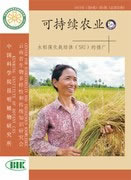
- 乾式種稻法 環保省水免農藥 [Article points out environmental benefits of SRI through reduced water and inputs]
April 1, 2014, China News (Taiwan) - The LEISA Chinese edition Issue 7 (at right) with focus on SRI (水稻强化栽培体 (SRI) 的推广): While there are no articles about Taiwan included, there are a number of useful Chinese language articles about SRI from around the world.
SRI Blog and Websites in Taiwan
- Society of Conservation Agriculture - System of Rice Intensification (CA-SRI)
- 台灣強化稻作栽培體系 (System of Rice Intensification in Taiwan, Taiwan-SRI) - blog.
- Taiwan SRI facebook (also has good information on equipment)
Research and Evaluations
- Zoundou, Sidnoma Daniel, and Yu-min Wang. 2019. Assessment of probiotic bacteria effects on rice growth and yield at reduced doses of chemical fertilizers in Pingtung, Southern Taiwan. International Journal of Science and Research 8(8): 2073 - 2080. [accessed February 2, 2022]
- Chiu, Hsin-Piao, et al. 2022. The assessment of rill irrigation and perforated pipes for Lowland paddy rice under the system of rice intensification (SRI). Paddy and Water Enviroment. doi:10.1007/s10333-021-00879-y
- Zoundou, S. Jean Paul, et al.l. 2019. Comparison of yields attributes and water productivity under the System of Rice Intensification (SRI) in southern Taiwan. Paper presented at the 3rd World Irrigation Forum, Bali, Indonesia, September 1-7, 2019. [accessed April 17, 2020]
- Tarigan, Raudha A., et al. 2019. Effect of irrigation, chemical fertilization, and probiotics in rice fields soil properties. 3rd World Irrigation Forum (WIF3). Sept. 1-7, 2019, Bali, Indonesia. [accessed April 25, 2020]
- Marrocco, Also Tommaso. 2017. Online informative and educational resources regarding the possibilities for sustainable intensification of agriculture. Journal of Taiwan Disaster Prevention 9(2): 181-195
- 林羿汝(Yi-Ju Lin), 邱儀婷(Yi-Tin Chiou), 邱儀婷(Yi-Tin Chiou), 陳清田(Ching-Tien Chen), 陳清田(Ching-Tien Chen), 李振誥(Cheng-Haw Lee), and 李振誥(Cheng-Haw Lee). 2017. 灌溉管理操作對水稻生長期距及灌溉用水效能影響之研究 The effects of Irrigation management practice on growth period and irrigation water use efficiency in paddy rice. Journal of Taiwan Agricultural Engineering 63(2): 1-14.
- Pascual, Victoriano Joesph, and Yu-Min Wang. 2017. Impact of water management on rice varieties, yield, and water productivity under the System of Rice Intensification in southern Taiwan. Water 9(1): 3. doi:10.3390/w9010003
- Chen, Shih-Kai, Cheng-Shin Jang, and Cheng-Bin Tsai. 2015. Assessing the changes of groundwater recharge / irrigation water use between SRI and traditional irrigation schemes in Central Taiwan. Presentation at the EGU General Assembly 2015, April 12-17, Vienna, Austria. (abstract only).
- Chang, Yu-Chuan, Norman T. Uphoff, and Eiji Yamaji. 2015. A conceptual framework for eco-friendly paddy farming in Taiwan, based on experimentation with System of Rice Intensification (SRI) methodology. Paddy and Water Environment (Online First March 2015): 1-15.
- Taiwan Journal of Water Conservancy, Volume 64, no. 4. (The issue, which contains 10 articles, is devoted to SRI. Articles are in English with Chinese language abstracts included.)
- Chang, Y., R. Chen, Y. Li, and H. Lu. 2012. SRI - The choice for paddy rice system in dealing with water deficiency and land shortage- 灌溉稻系統在面對水與耕地短缺下的選擇--稻作強化栽培體系. Water Resource Management Society Journal - 水資源管理會刊 14(1): 38-44.
- [The China RefWorks database has 100+ research articles about SRI, many in Chinese language; hopefully the number of articles from Taiwan will increase in the near future.]
Videos
- 2022 (July7). SRI Farming Method (省3成!SRI水稻栽培技術). 5:31 min. Tzu Chi Culture and Communication Foundation channel, YouTube. [Mechanized SRI in Taiwan]
Presentations
- 2022 (July7). SRI Farming Method (省3成!SRI水稻栽培技術). 5:31 min. Tzu Chi Culture and Communication Foundation channel, YouTube. [Mechanized SRI in Taiwan]
- Yu Chuan Chang. 2016. Development of Conservation Agriculture – System of Rice Intensification in Taiwan (SRI 保育型農業環境的推展). Presentation at the First General Meeting of the Society of Conservation Agriculture - System of Rice Intensification (CA-SRI) in Taipei, Taiwan, July 2. [in Chinese]
- Kan, Chun-E. 2015. System of Rice Intensification (SRI) in Taiwan: Results of Trials, Adapting to Existing Farming Systems and Local Conditions, and Making Links with the Private Sector. Presented at Cornell University, April 16, 2015. 20 slides. [uploaded April 20, 2015]
- System of Crop Intensification (in Chinese). [accessed from Taiwan-SRI blog]
- Chang, Y. C., R. S. Chen, K .H. Lin, Y. C. Cheng, J. I. Hu, Eiji Yamaji, Kunihiko Yoshino, Eikichi Shima, Hiroyuki Fujisaki, and Masaya Ishikawa. 2011. Adapting Water Management Practice to the Double Exposure of Climate Change and Globalization:System of Rice Intensification in Taiwan. Paddy and Water Environment Engineering Society Conference, October 27, Taipei, Taiwan. 30 slides.

